I was given the opportunity to tour the Sonoco Recycling Facility in east Raleigh this past week. It was great, a good learning experience and really neat to boot.
Raleigh has switched to a “single stream” recycling program. That means that instead of sorting all your materials at the curb and putting those materials into different bins within the truck, you can mix all your items together and they get transported to the recycling facility mixed together. This is a cost-savings measure for the city of Raleigh as it means they can use less sophisticated waste pickup trucks, and the pickup crews can move faster and more efficiently. I also think that more people will be likely to recycle because now it should take less work to recycle.
The impact of comingling recycling materials is that once it arrives at the MRF (materials recovery facility), it then all must be separated. That’s what we learned about in our tour of the facility. I tried to document in pictures and videos. It is really an amazing process and watching these people in action makes me want to work harder to keep contaminants out of my recycling bin.
A few tips I learned while I was there.
- Trash doesn’t belong in the recycling bin. There are people who have to pull it out by hand if you put trash with the recycleables in your bin.
- Follow Raleigh’s easy-to-use list of acceptable materials when selecting items for recycling.
- The biggest contaminate to the recycling stream are plastic clamshell packages and plastic bags, neither of which is recycleable.
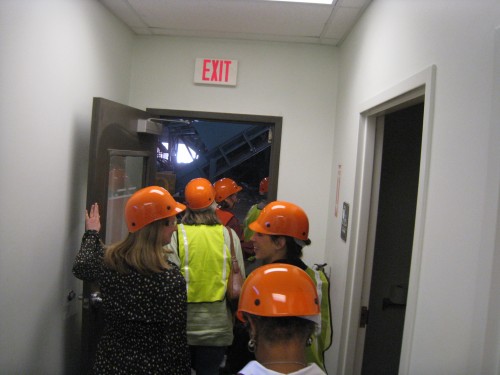
To see the pictures and video of my tour, read the rest of the article.
Sonoco is pretty cool because they do not just do recycling. They are also part of a larger company, which means they take what they harvest from recycling and use it to make post-consumer recycled product packaging.
Here is some of the product packaging they produce.
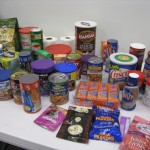
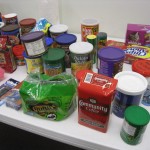
Here is the initial pile of recycleable materials as they arrive at the facility. It’s a huge pile and they use this front-loader to push it onto the conveyer belt.
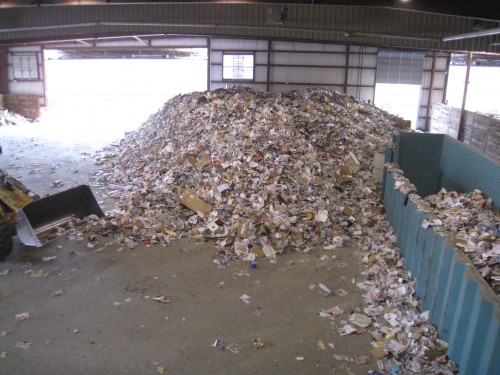
Here is a partial view of the machine that helps sort the material.
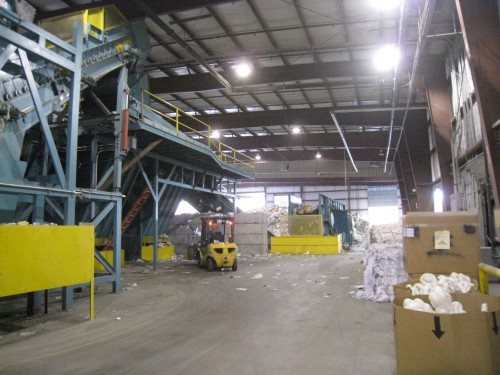
This is the bottom of that machine, and this collection area contains plastic bags. There are a lot of plastic bags there, and they will eventually be sent to the landfill. It costs more to recycle plastic bags than it does to make new ones.
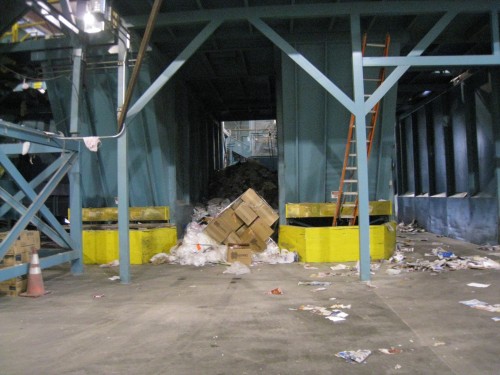
This view from above shows the labor used in sorting the materials. The machine does sort out some materials mechanically, but the rest is left to the human workers.
Here’s a video of the sorters in action:
Here is another part of the sorting process. You can see that this portion requires much more labor than the one in the previous shot. After this, what’s left is mostly aluminum cans and steel cans.
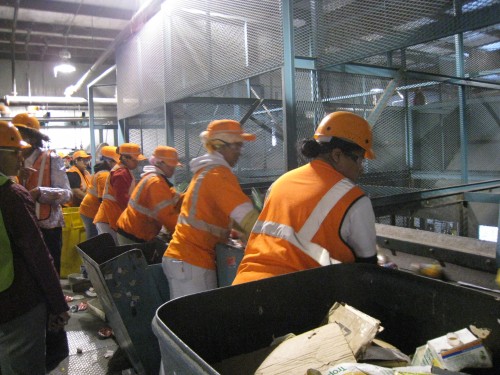
Steel cans are removed via this cool magnet:
This video shows the eddy current in action, sending out the aluminum cans to be deposited in the cage below and depositing the remaining trash into another receptacle:
Here is the final step in the sorting – the glass (and trash) that winds up in this huge pile outside. The material is collected and sent to the glass recycler.
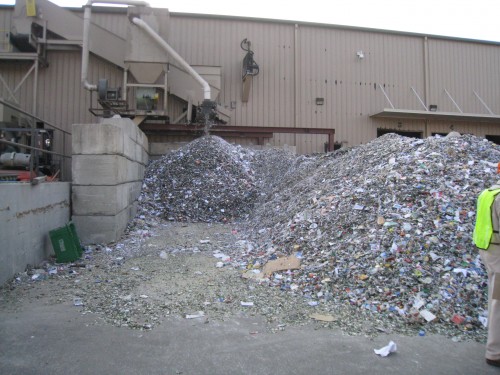
Look closely at this pile. Can you see all the trash? Can you pick out all the non-recyleable materials?
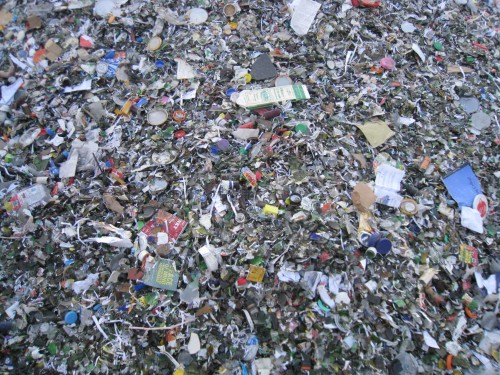
While we were there, they were baling paper, so they just threw all the paper down onto the floor which has a giant conveyer belt built into it. This strange view is looking down from above at the “river of paper” headed towards the baling machine. The conveyer belt in the floor moved foward in regular pulses and pushed this giant pile of paper toward the baler.
Here is the baler in action:
And here is the end product of this facility – giant bales of either cardboard, mixed paper, plastic bottles, plastic jugs, or aluminum or steel cans.
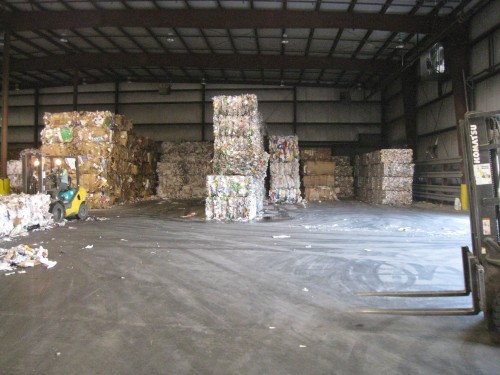
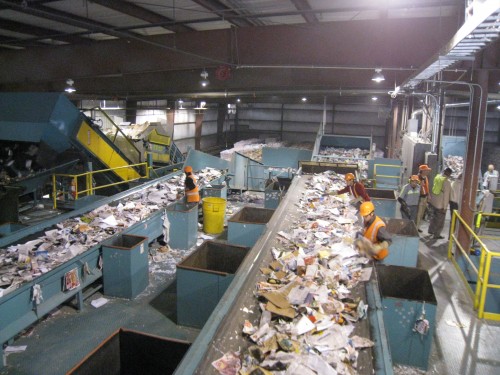
Plastic bags aren’t recyclable? Why do they want you to turn them in at the grocery store? I want to work in this job. Or construction. It would be so much more meaningful. But I bet the pay is awful.
“It takes 90-100 years for a tin can to decompose and she still won’t recycle… You know. Somebody. Ought to kill her… Yea. Then recycle her… For the sake of this planet, somebody just might.” Begins at 3:45 here: http://www.youtube.com/watch?v=c2PK3zVQdZo
Comment by Cristin — March 7, 2009 @ 1:08 pm
First off, let me point out that the information I provided was for the City of Raleigh. It is possible that your city may work with a different MRF and therefore may have different rules. The Sonoco recycler does not recycle plastic bags, even though many grocery stores themselves offer this service. However, it sounds like what the grocery stores do with them may vary from store to store, so if you want to know what your local store is doing with reclaimed plastic bags, it’s best to ask them directly.
In Raleigh, when you add plastic bags to the recycle bin, you simply add trash to the “stream,” which must be filtered out before all is said and done.
P.S. I typically take bags out of the plastic bag recycle bins for my daily cat poop collection. So that’s one way they are recycled. 🙂
Comment by JeniQ — March 8, 2009 @ 9:33 pm
That video was funny. I’ve never seen that movie but it looked like good, campy fun.
Comment by JeniQ — March 8, 2009 @ 9:41 pm
Great post, Jeni! Taking plastics bags to a grocery store that collects them is the best way to help them be recycled. My understanding is that the stores are collecting the plastic film that is used to shrink wrap their products, and providing bag collection containers for shoppers is just a bonus.
Comment by Bianca Howard — March 9, 2009 @ 8:10 am
The plastic bags are also a big headache at the recycling facility! The get hung up on the rollers that mover the conveyer belts along and can even shut the equipment down & burn up motors. This can be costly – not only in replacement motors, but downtime! How about saying “no” to both plastic & paper at the store & taking your own reusable tote to stores?
Comment by Linda — March 9, 2009 @ 8:43 am
I asked the manager of my local Kroger 2-3 years ago about the plastic bags. He said they are sent back to to their regional HQ (in otherwise mostly empty trucks) where they are sent to a facility that makes new grocery bags for them. That is far superior (including in energy use) to anything good that can happen to a supposedly decomposable brown paper bag.
Comment by Mike — March 9, 2009 @ 10:09 am
Yea, the only thing I could figure is that the city might not recycle but the grocery store does because ever since I lived in Ohio I’ve been taking plastic bags to the store for recycling and they all have the recycling triangle on them. Phfew. Was about to be very disturbed.
We’ll just have to remedy the fact that you haven’t seen Serial Mom cuz it’s just too good. And will lyao.
Comment by Cristin — March 9, 2009 @ 11:25 am
Jen, I don’t imagine that the photo you took of me next to the warning sign was good enough to include on your blog. BTW, I’m impressed with your blog, even videos! But I wanted to have a copy of my photo to put in our ‘newsletter’… I’m so old-fashioned and ‘behind the times’ in terms of the technology I use, unlike you! Could you email it to me?
Comment by Jennifer Snow Wolff — March 9, 2009 @ 11:58 am
Jennifer,
The picture actually turned out really good – it’s very cute. I’ll email it to you this week.
Comment by admin — March 9, 2009 @ 12:10 pm
Awesome job Jennifer, I was on the tour too—but this is great to forward on to folks that I have been telling about the visit!
Comment by Jeannie — March 9, 2009 @ 4:47 pm
Thank you so much for posting these videos & photos. I never understood how it was done until now.
Comment by Matthew Brown — March 11, 2009 @ 9:43 am
Jennifer’s done a real service, using her video and stills to such good effect. I’ve always wondered just what went on at the Sonoco plant; now I don’t need to go tour it.
Besides, the sorting process has convinced me it’s silly to do the sorting by materials I got in the habit of doing years ago. That will save time.
Does the statement that plastic bags cost too much to recycle apply also to those we take to the grocery bins–or just to Sonoco?
Comment by Ann Berry — March 14, 2009 @ 12:27 am
@Ann-
Thanks for the kind words. It was a really great experience and I’m so glad I went!
Regarding the plastic bags, that statement refers to Sonoco’s cost. They collected plastic bags for about a year and then sold them to the recycler but when they considered the fuel charges, they only broke even. It’s not cost-effective for Sonoco to dedicate storage space in their facility to be able to amass enough to sell to the recycler, so they just throw them away.
As far as grocery store bag recycling, check Bianca’s post above yours.
Comment by JeniQ — March 14, 2009 @ 9:16 am
@Matthew Brown-
Thanks! Please pass this link on to anyone who wants to know more about single-stream recycling.
Comment by JeniQ — March 14, 2009 @ 9:16 am
@Jeannie-
You bet!
Comment by JeniQ — March 14, 2009 @ 9:17 am
@Mike-
I think if people are actually composting their brown paper bags or recycling them, that’s OK, but it may not be happening. I guess the right answer for all of us is to use our own bags at the grocery. I wonder what would happen if the people who made plastic bags just quit?
Comment by JeniQ — March 14, 2009 @ 9:22 am
[…] Seems strange that this is the first time we’ve eschewed the traditional plastic bags, given my interest in recycling, but I really wasn’t sure how to start. I was a little nervous about the whole process. How […]
Pingback by I [heart] Davids · Thrifty — May 17, 2009 @ 5:21 pm